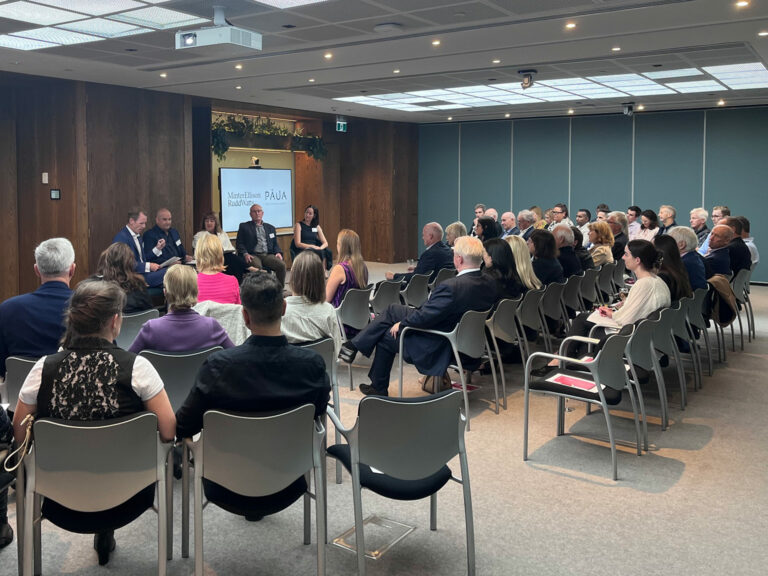We recently hosted an event in collaboration with MinterEllisonRuddWatts on topical private wealth issues for modern families, particularly given succession planning is well underway with over $1trillion transferring in the next two decades in New Zealand.
Our panel included Andrew Ryan, Tax Partner at Minters, Iain Blakeley, Chair of the Family Business Association, Aimee Mitchell, Private Wealth Partner at Minters and Donna Nicolof, CEO at Pāua Wealth Management.
The panel discussed the implications for family trust structures of cross-border, mobile and blended families, the new trustee tax rates and implications for your investment strategy.
Below is a summary of the key points from our discussion:
Topical issues that are top of mind right now
With the changes in the trustee tax rate increasing to 39% from 1 April, applying to all trusts that earn a net annual income of over $10,000 many clients are considering the impact of this change and what steps, if any, to take in response. There is increasing recognition of the need to broaden the tax base to address sustainability of the tax take over the long-term and whilst there doesn’t appear to be any current political appetite for the introduction of a capital gains tax, the government is coming under increasing pressure as the IMF has repeatedly recommended the introduction of a CGT in New Zealand, in line with comparable jurisdictions.
Succession planning & Governance
The economic situation and Covid have delayed some clients from taking steps in relation to succession planning and having the important family conversations. Sometimes, circumstances are intervening where clients are becoming ill, incapacitated or pass away before any material steps have been taken, which is giving rise to other problems and disputes. Family governance is about fostering a sense of family unity around a family mission or purpose for the family wealth. A family’s policies and governance systems follow and respond to a family’s purpose and objectives. Communication and engagement with the family is critical to educate, build trust and family buy-in, and manage expectations. There is a need to start discussions about succession and family governance earlier as rushing these conversations (or not engaging with the next gen at all) can jeopardise success.
Implications for investment
With the changes to the tax rate and trustee responsibilities, trustees are rightly asking more questions in relation to how their investments are structured and how capital is deployed, particularly given the relative tax efficiency of PIEs i.e. 28% versus 39%. Pāua Wealth Management are seeing increased demand from clients of large broking firms to undertake portfolio reviews of current arrangements and request for services. Whilst tax considerations are important, they are only one aspect of investment decision-making and as such trustees are taking the opportunity to review their current investment strategy to ensure its appropriately globally diversified.
The future of Trusts – are they worth it?
With the many changes to trust law over the last few years and increased compliance costs, many are questioning whether they are still relevant. Trusts are still considered the ‘gold standard’ for family wealth protection and succession planning as they have attributes that cannot be easily replicated using other vehicles. These include for example, flexibility, privacy, asset protection and prevention of asset fragmentation. The key consideration remains purpose as most trusts are established as multi-generational asset holding structures with asset protection and succession objectives.
How are successful New Zealand families investing?
Many are in the process of diversifying their wealth away from operating businesses and establishing trusts or foundations to achieve their objectives. Keeping things simple is key and much of your investment philosophy and approach can be delivered through a Statement of Investment Policy and Objectives or ‘SIPO.’ That said, there is more focus on governance around investment decision-making with an increased reliance on advisers and establishment of an Investment Committee or Family Board to facilitate decision-making, where required i.e. depending on size and complexity. A key priority is preparing the next generation to be responsible custodians of the wealth through engaging early and building capability for example, through education, working in the business and/or participating in family governance.
Cross border considerations for modern families
Modern families are increasingly international with more young people choosing to study and work overseas. As such, cross border tax and wealth planning issues are becoming increasingly prevalent. There may be inadvertent tax consequences if overseas beneficiaries are financially supported by a New Zealand trust. This can include significant tax charges and compliance obligations on the recipient in the country in which they are resident. Generally, it is preferable for children based overseas to receive benefits from their parents directly, although advice should always be sought in the country in which the beneficiary is resident.
Issues also arise where settlors and trustees move overseas permanently or spend significant time in a particular place with some regularity. Seek specialist tax advice whenever individuals are spending regular time in a jurisdiction or acquiring property there.
Blended families
Communication is key to maintaining positive family relationships and managing expectations of blended families to prevent disputes arising later. Clarity and transparency between partners is essential. Relationship property agreements are increasingly being used to record mutually agreed outcomes to apply to each party’s assets on a separation or death.
Philanthropy
Families are increasingly seeking to ‘give back’ to the community by pursuing social and philanthropic activities. Having a well thought out strategy including for example, charitable objective, area of focus and funding model to reflect the family’s values and reviewing this regularly will ensure giving is more effective.
If you’d like to know more, feel free to contact either Donna Nicolof, donna@pauawealth.com or Aimee Mitchell, aimee.mitchell@minterellison.co.nz.
